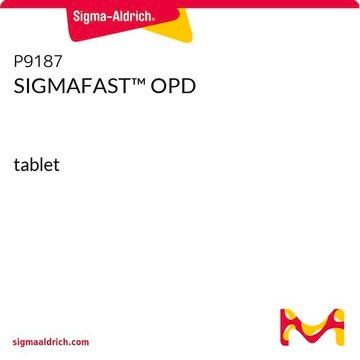P9029
o-Phenylenediamine
peroxidase substrate, chromogenic, ≥98.0%, powder
Synonyme(s) :
1,2-Diaminobenzene, 1,2-Phenylenediamine, OPD
About This Item
Produits recommandés
product name
o-Phenylenediamine, Peroxidase substrate, ≥98.0%, powder
Densité de vapeur
3.7 (vs air)
Pression de vapeur
0.01 mmHg ( 25 °C)
Pureté
≥98.0%
Forme
powder
Couleur
white to off-white
Point d'ébullition
256-258 °C
Pf
98-102 °C
Solubilité
ethanol: 50 mg/mL, clear, colorless to faintly yellow
Fluorescence
λex 337 nm; λem 417 nm (Pyruvic acid derivative)
Température de stockage
2-8°C
Chaîne SMILES
Nc1ccccc1N
InChI
1S/C6H8N2/c7-5-3-1-2-4-6(5)8/h1-4H,7-8H2
Clé InChI
GEYOCULIXLDCMW-UHFFFAOYSA-N
Vous recherchez des produits similaires ? Visite Guide de comparaison des produits
Catégories apparentées
Description générale
Application
Attention
Mention d'avertissement
Danger
Mentions de danger
Classification des risques
Acute Tox. 3 Oral - Acute Tox. 4 Dermal - Acute Tox. 4 Inhalation - Aquatic Acute 1 - Aquatic Chronic 1 - Carc. 2 - Eye Irrit. 2 - Muta. 2 - Skin Sens. 1
Code de la classe de stockage
6.1C - Combustible acute toxic Cat.3 / toxic compounds or compounds which causing chronic effects
Classe de danger pour l'eau (WGK)
WGK 3
Point d'éclair (°F)
276.8 °F - closed cup
Point d'éclair (°C)
136 °C - closed cup
Certificats d'analyse (COA)
Recherchez un Certificats d'analyse (COA) en saisissant le numéro de lot du produit. Les numéros de lot figurent sur l'étiquette du produit après les mots "Lot" ou "Batch".
Déjà en possession de ce produit ?
Retrouvez la documentation relative aux produits que vous avez récemment achetés dans la Bibliothèque de documents.
Les clients ont également consulté
Articles
NBT-BCIP substrate system aids in western blotting and immunohistological staining, producing a blue-purple insoluble end product.
Notre équipe de scientifiques dispose d'une expérience dans tous les secteurs de la recherche, notamment en sciences de la vie, science des matériaux, synthèse chimique, chromatographie, analyse et dans de nombreux autres domaines..
Contacter notre Service technique








